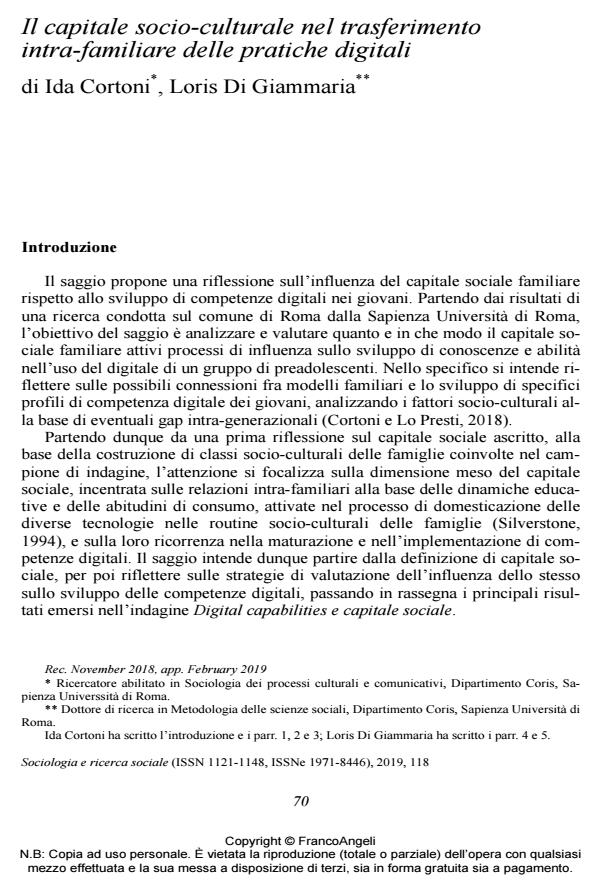The socio-cultural capital in the intra-family transfer of digital practices
Journal title SOCIOLOGIA E RICERCA SOCIALE
Author/s Ida Cortoni, Loris Di Giammaria
Publishing Year 2019 Issue 2019/118 Language Italian
Pages 18 P. 70-87 File size 348 KB
DOI 10.3280/SR2019-118004
DOI is like a bar code for intellectual property: to have more infomation
click here
Below, you can see the article first page
If you want to buy this article in PDF format, you can do it, following the instructions to buy download credits

FrancoAngeli is member of Publishers International Linking Association, Inc (PILA), a not-for-profit association which run the CrossRef service enabling links to and from online scholarly content.
The essay reflects on the influence of family social capital, with reference to the development of digital skills in youth. Stemming from the results of a re-search carried out in the city of Rome by the Sapienza University of Rome, the aim of the essay is to analyze how family social capital activates processes of influence on the development of knowledge and communication skills of a group of preadolescents. Reflection on the ascribed social capital is followed by a focused analysis on the meso dimension of social capital, centered on the rela-tionships within the family, core of educational dynamics and consumption hab-its.
- P. Aroldi (a c. di) (2011), Media+ Generations. Identità generazionali e processi di mediatizzazione, Milano, Vita e Pensiero.
- C. Barone, A. Schizzerotto (2006), Sociologia dell’istruzione, Bologna, il Mulino.
- I. Bartholini (2008), Capitale sociale, reti comunicative e culture di partecipazione, Milano, FrancoAngeli.
- P. Bourdieu (1979), La distinction. Critique sociale du Jugement, Paris, Minuit; tr. t., La distinzione. Critica sociale del gusto, Bologna, il Mulino, 1983.
- M. Castells (1996), The Information Age: Economy, Society and Culture, Oxford, Blackwell Publishers.
- A. Cobalti, A. Schizzerotto (1994), La mobilità sociale in Italia, Bologna, il Mulino.
- J. Coleman (1988), «Social Capital in the Creation of Human Capital», The American Journal of Sociology, 94, pp. S95-S120.
- J. Coleman (1990), Foundations of Social Theory, Cambridge-London, The Belknap Press of Harvard University Press; tr. it., Fondamenti di teoria sociale, Bologna, il Mulino, 2005.
- J. Coleman (1994), Foundation of Social Theory, Cambridge (MA), Harvard University Press.
- I. Cortoni (2016), «Digital Competencies and Capabilities. Pre-adolescents Inside and Outside School», Italian Journal of Sociology of Education, VIII, 2, pp. 170-85,
- I. Cortoni (2017), Famiglia e cittadinanza digitale. Interazioni e influenze nei preadolescenti, in C.M. Scarcelli, R. Stella (a c. di) (2017), Digital literacy e giovani. Strumenti per comprendere, misurare, intervenire, Milano, FrancoAngeli.
- I. Cortoni, V. Lo Presti (2014), «Verso un modello di valutazione delle competenze digitali», Rassegna italiana di valutazione, XVIII, 60, pp. 7-23, DOI: 10.3280/RIV2014-060002
- I. Cortoni, V. Lo Presti (2018), Digital Literacy e capital sociale. Una metodologia specifica per la valutazione delle competenze, Milano, FrancoAngeli.
- P. DiMaggio, E. Hargittai (2001), From the «Digital Divide» to «Digital Inequality»: Studying Internet Use as Penetration Increases. Working paper series 15, Princeton (NJ), Princeton University Center for Arts and Cultural Policy Studies.
- P. Donati (a c. di) (2007), «L’approccio relazionale al capitale sociale», Sociologia e politiche sociali, X, 1, pp. 9-39.
- H.B. Ganzeboom, P.M. De Graaf, D.J. Triman (1992), «A Standard International Socio-economic Index of Occupational Status», Social Science Research, 21, pp. 1-56.
- J.H. Goldthorpe (1996), «Il voto di classe in Gran Bretagna», Polis, aprile, pp. 39-62.
- M. Granovetter (1995), Getting a Job, Chicago, University of Chicago Press.
- P. Hedström (1998), Rational Imitation, in P. Hedström, R. Swedberg (eds.) (1998).
- P. Hedström, R. Swedberg (eds.) (1998), Social Mechanisms. An Analytical Approach to Social Theory, Cambridge, Cambridge University Press.
- G. Loury (1977), A Dynamic Theory of Racial Income Difference, in P. Wallace, A. LeMunds (eds.) (1977), Women, Minorities and Employment Discrimination, Lexington, Lexington Books.
- M. Morcellini (1997), Passaggio al futuro, Milano, FrancoAngeli.
- M. Morcellini, I. Cortoni (2007), Provaci ancora scuola, Brescia, Erickson.
- M.C. Nussbaum (2000), Women and Human Development: The Capabilities Approach, Cambridge, Cambridge University Press.
- M. Palumbo (2001), Il processo di valutazione. Decidere, programmare, valutare, Milano, FrancoAngeli.
- R.D. Putnam (1993), La tradizione civica delle regioni italiane, Milano, Mondadori.
- P. Ricci Sindoni (2012), «Essere figli oggi: problemi di antropologia della famiglia», I quaderni di Scienza e Vita, 10, pp. 33-40.
- G. Riva (2014), Nativi digitali. Crescere e apprendere nel mondo dei nuovi media, Bologna, il Mulino.
- G. Scidà, R. Rizza (2003), Capitale sociale, lavoro e sviluppo, Milano, FrancoAngeli.
- A. Sen (999), Development as Freedom, Oxford, Oxford University Press.
- R. Silverstone (1994), Television and Everyday Life, London, Routledge.
- N. Stame (1990), Strategie familiari e teorie dell’azione sociale, Milano, FrancoAngeli.
- J. Van Dijk (2005), The Deepening Divide, Thousand Oaks (CA), Sage.
- M. Warschauer (2003), Technology and Social Inclusion: Rethinking the Digital Divide, Cambridge (MA), Mit Press.
Ida Cortoni, Loris Di Giammaria, Il capitale socio-culturale nel trasferimento intra-familiare delle pratiche digitali in "SOCIOLOGIA E RICERCA SOCIALE " 118/2019, pp 70-87, DOI: 10.3280/SR2019-118004